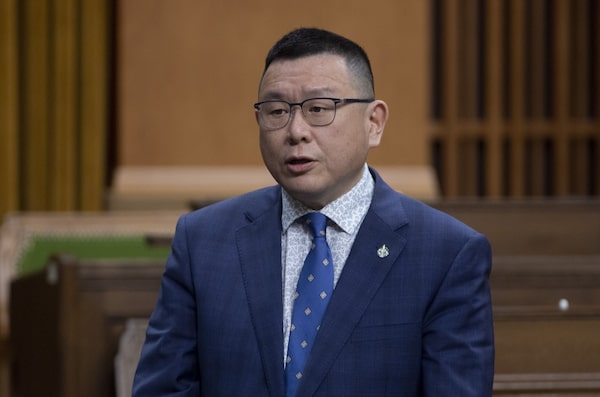
Former Conservative MP Kenny Chiu rises during question period in the House of Commons, April 13, 2021, in Ottawa.Adrian Wyld/The Canadian Press
A Conservative senator apologized Wednesday for accusing a member of his own party of lying in a still-simmering debate over whether a disinformation campaign cost Kenny Chiu his job as a member of Parliament last year.
Victor Oh, who appointed to the Senate by then-prime minister Stephen Harper, publicly lashed out at Mr. Chiu earlier this week, telling a fellow Conservative senator in the Red Chamber that the former Conservative MP was “lying to you” about what happened.
Mr. Chiu, a one-term MP, lost his Steveston-Richmond East seat in the 2021 election. During the election campaign, he was the target of criticism on Chinese-language social media over his proposed bill to set up a public registry in Canada that would track foreign influence campaigns.
The United States has a foreign agent registry. In 2018, Australia set up a Foreign Influence Transparency Scheme and, last year, Britain launched consultations on enacting a similar registry.
In Canada, the matter is being debated in the Senate because Conservative senator Leo Housakos has tabled a bill that is similar to what Mr. Chiu introduced in the Commons in 2021. The previous bill died when the election campaign was called.
Disinformation campaign against former MP Kenny Chiu a disturbing precedent, researchers say
Opinion: Did China target a Conservative MP in Canada’s last federal election?
In an article in the magazine Policy Options on Jan. 4, two researchers at McGill University said the disinformation campaign against Mr. Chiu was a disturbing demonstration of how propaganda tactics could be used by hostile foreign actors to interfere with Canada’s political system.
Sze-Fung Lee and Benjamin Fung, experts on information warfare, suggested a countermeasure to discourage future disinformation efforts would be a public registry to track foreign influence.
The disinformation effort against Mr. Chiu was also documented by the Atlantic Council think tank’s Digital Forensic Research Lab (DFRLab).
During the 2021 election campaign, Mr. Chiu’s proposal was condemned on Chinese-language social media and one article said his plan would suppress the Chinese community in Canada. Criticism was disseminated on apps and websites widely used by Canadians of Chinese origin, a group that made up approximately half of the B.C. riding that Mr. Chiu represented.
The election campaign attack on Mr. Chiu painted his registry proposal as an effort aimed at China.
One article circulating in the Chinese-language media said that, at a time when China-Canada relations were at an all-time low, Mr. Chiu’s bill was aimed at curbing any pro-China rhetoric in Canada. It alleged the bill would be used to monitor individuals and groups affiliated with Mainland China. The article said that if readers cared about the well-being of the Chinese community, they would spread the message.
The anonymous attacks also called Mr. Chiu anti-China because he had been an outspoken critic of Beijing’s crackdown on dissent and protest in Hong Kong and because he had backed a motion condemning the Chinese government’s repression in Xinjiang.
Mr. Oh in the Senate on Tuesday accused Mr. Chiu of “going bizarre” and behaving like the “Minister of Foreign Affairs” during his time in public office. He said he warned Mr. Chiu “you are supposed to work for Canadians and not Foreign Affairs.”
The senator also said he upbraided Mr. Chiu for blaming his bad fortune on a disinformation campaign.
“Now you are claiming that you have Chinese agent influence that sabotaged you. I said that’s not true.”
On Wednesday, Mr. Oh rose in the Senate and apologized for “making an unsupported claim” a day earlier. “I disagree with Mr. Chiu and Senator Housakos about the allegation of disinformation during the last general election but should not have said that Mr. Chiu lied,” he said.
Mr. Oh’s office did not immediately respond to a request for comment.
Mr. Chiu said he accepts his former parliamentary colleague’s apology.
The former MP said Wednesday he thinks the disinformation campaign was a “contributing factor” in the loss of his seat. Mr. Chiu acknowledges there is no “smoking gun” to prove criticism of the registry was funded by a foreign government but he pointed to analysis of the campaign by experts such as DFRLab.
Conservative foreign affairs critic Michael Chong, for his part, said he thinks disinformation about the registry cost the party at least three seats in the last federal election and had an impact in more than a dozen ridings. He said he’s disappointed Ottawa has not enacted measures to prevent a recurrence. Last fall, the Canadian Security Intelligence Service said in a statement: “The government of Canada did not detect foreign interference that threatened Canada’s ability to have a free and fair election.”
Senator Yuen Pau Woo, appointed to the Senate by Justin Trudeau, has disputed the notion that Mr. Chiu was the victim of disinformation. In a Policy Options article from Jan. 31, he said criticism of the foreign agent registry amounted to legitimate debate.
He argued Mr. Chiu bill’s registration requirements would have cast a very wide net in the case of China. “Given that the People’s Republic of China (the PRC) is an authoritarian state, one could reasonably argue that all legally constituted entities in China – including corporations, educational institutions, alumni organizations, cultural groups, and municipalities – fall under the definition of foreign principal,” he wrote.
For subscribers: Get exclusive political news and analysis by signing up for the Politics Briefing.
 Steven Chase
Steven Chase